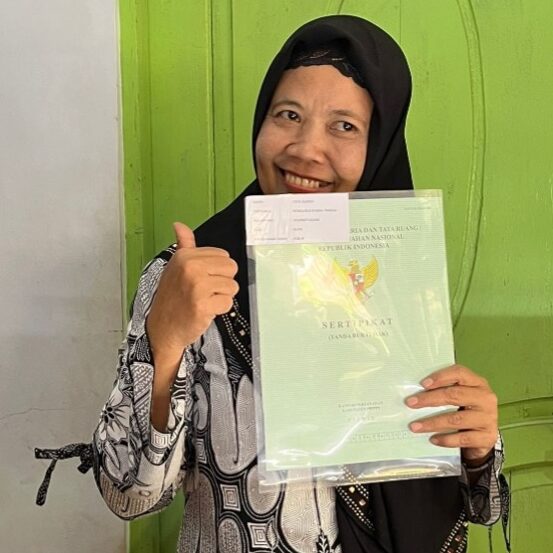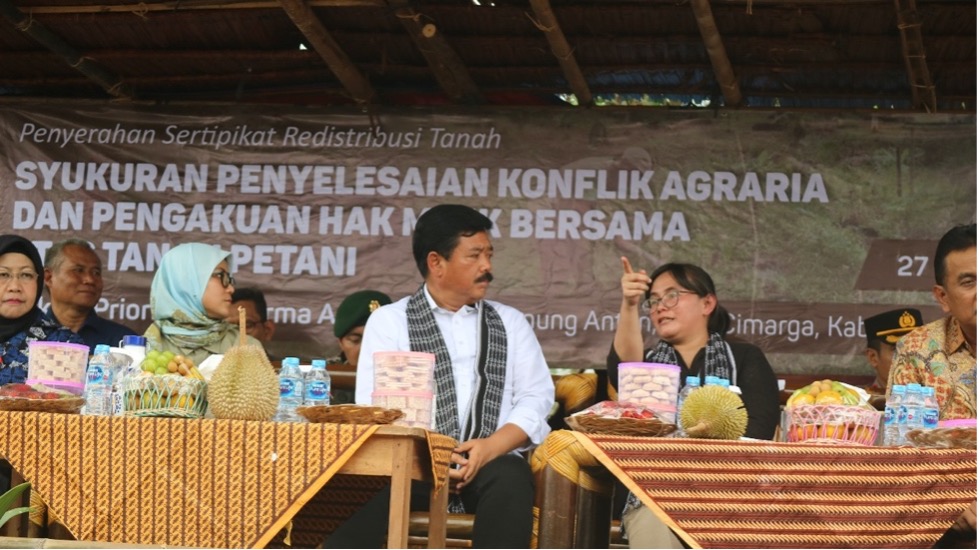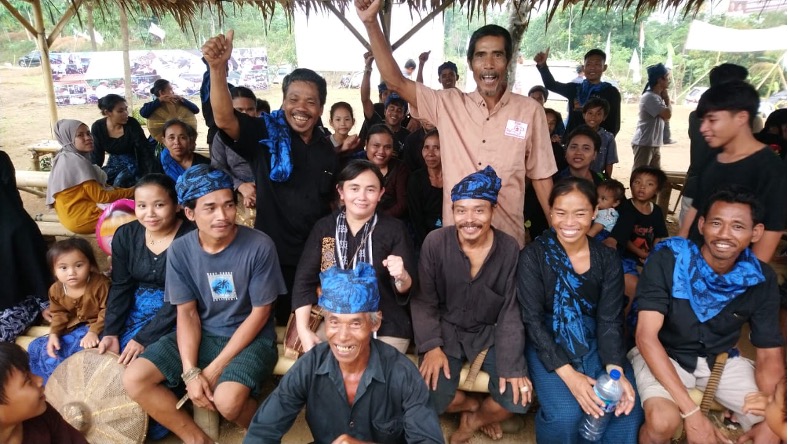2023-12-22
By Anne-Sophie Gindroz
Cicin Juarsim, 52, smiled with joy when the land she has been cultivating officially became hers. “Now I am holding a private ownership certificate in my land. This is not only important for me. This land is important for my children,” said Cicin Juarsim who lives in Muktisari village, Ciamis District, in Indonesia’s western province of Java.
On 12 October, the Agrarian Affairs Minister, Hadi Tjahjanto, handed Cicin Juarsim her land certificate. Many other women also benefited, with almost half of the area redistributed as farmland to the Pasundan Peasant Union (SPP) in Ciamis now titled in women’s names.
The SPP has been fighting for 24 years to get legal recognition of the tenure rights on land that was part of the PT Maloya industrial plantation concession. Peasants have been occupying the area, growing food crops and planting fruit trees and coffee. After decades of pressure, the peasants’ rights to this land were finally recognised.
The SPP is a member of the Consortium for Agrarian Reform (KPA), a key Tenure Facility partner in Indonesia. KPA was established in 1994 by peasant organisations, traditional fishermen, Indigenous Peoples, women and NGOs. KPA membership consists of 139 community organisations in 22 provinces of Indonesia. The majority of its members are district-level peasant unions.

Cicin Juarsim holding her land certificate in October.
In implementing the agrarian reform programme, the Indonesian government tends to focus on the formalisation aspect, issuing certificates to those occupying undisputed land. But KPA and its members are pushing for land redistribution defined by the communities under the Priority Locations for Agrarian Reform (LPRA) system put in place by KPA. This is a bottom-up approach to counter the top-down agrarian reform implemented by the government.
The LPRA system provides peasant unions and Indigenous Peoples’ organisations with data necessary to push the government to implement the agrarian reform’s land redistribution. So far, KPA submitted 665,000 hectares of LPRAs to benefit 195,000 households spread over 532 villages in 104 districts and 20 provinces. KPA, together with the central and/or regional government, carries out data verification and field validation of proposed LPRAs for land redistribution.
Engaging with the government
To accelerate the resolution of agrarian conflicts and land redistribution to communities, KPA is building collaboration with the government, in particular with the Ministry of Agrarian Affairs and Spatial Planning/National Land Agency. A special task force for the Acceleration of Land Redistribution and Conflict Resolution in LPRA locations was established between the Ministry and KPA through a ministerial decree in November 2022. This task force is opening a new space for more collaboration and smooth communications between the two parties.
The government has prioritised 44 LPRAs proposed by KPA covering 24,774 hectares and 34,234 households. Thirty locations are currently in the process of being distributed to peasant organisations under the task force. Two were redistributed to communities in October 2023.

"Now I am holding a private ownership certificate in my land. This is not only important for me. This land is important for my children."
KPA has been advancing women’s land rights recognition on areas redistributed under the agrarian reform programme, an effort supported by Tenure Facility. On 12 October in Ciamis, 113 hectares were redistributed to the SPP based on a KPA request filed with the government in 2016. KPA ensures that women are direct beneficiaries of land redistribution through the production of ‘maps by gender’. In Ciamis, 49% (or 26.5 hectares) of the 53.9 hectares of agricultural land was allocated to women.
On 27 October in Lebak, Banten province, 135 hectares of land was redistributed by the Agrarian Affairs Minister to the Banten Peasant Movement, which had been in conflict with a rubber plantation for decades. To strengthen land equity under the Banten Peasant Movement, its members decided to allocate 25% of the land to those 17 to 35 years old, and 33% of the land has been registered in the names of women.
Both in Ciamis and Lebak, land equity for women and young people was realised even before the government granted legal recognition. This was achieved through a consensus reached within the community on land ownership, a consensus encouraged by KPA and the peasant organisations.
Tinah is a young member of the Banten Peasant Movement who became a landowner in Gunung Anten village, Banten. Young women “are so grateful for the legal recognition of our land rights. Even before this recognition, our organisation already affirmed our land rights through consensus,” she said.

Advancing collective rights recognition
KPA is strengthening collective land governance by peasant organisations through land use plans jointly designed by the unions to make collective decisions on allotment and land utilisation. These include areas set aside for social welfare, public facilities, collective land and conservation. This consensus building involves active participation of young cadres and women peasants. In Ciamis, the Peasant Union set aside 43.6 hectares for educational facilities, including a school for people with disabilities; a research and agricultural development institute; a tourism camp; and a watershed area.
But so far, the National Land Agency has only issued individual titles for housing and farming areas. In October 2023, the National Land Agency agreed for the first time to issue collective titles, when 135 hectares of land reclaimed by a KPA member, the Banten Peasant Movement, was redistributed to 198 families in Gunung Anten village. Having one land title with the names of all the rightsholders is an important step for KPA and its members towards formalising collective land rights, when a joint ownership scheme is favoured by peasant unions. In Banten, collective lands have been reserved for farming, worship places, sports fields, peasant union meeting spaces, access roads, as well as areas for a public school and market, based on the community’s shared aspirations.
Fulfilment of land rights must be fought for consistently from within the community, without waiting for the government to redistribute land to peasants, fisherfolks and Indigenous Peoples. Agrarian reform is not only a matter of legalising land rights. It is about ensuring land ownership equity within the community and that conflict resolution and land redistribution processes bring people prosperity and peace. This is a vision that KPA continues to aspire to and has sought since its founding in 1994.
Articles